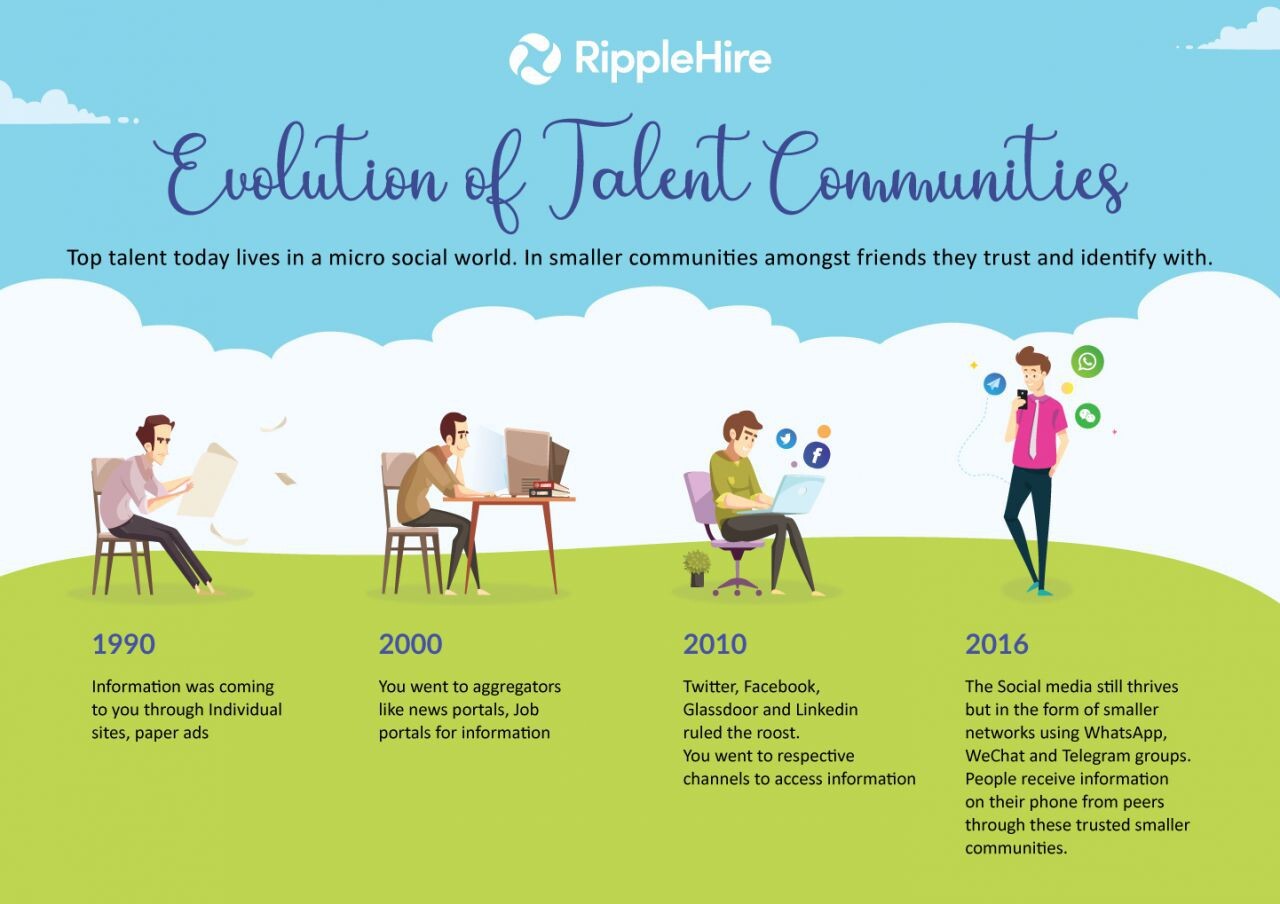Table of content
Evolution of Talent Communities
Not too long ago, hiring meant job boards, resume portals, and mass applications. You’d post a job, wait for the resumes to roll in, and hope the right one showed up.
But that model doesn’t hold up in 2025.
Today’s talent doesn’t live on job portals. They live in micro-communities. They hang out on WhatsApp groups, follow niche creators on Instagram, and engage in Slack channels, Discord servers, and LinkedIn threads that align with their values.
If your recruiting model is still waiting for applicants to hit “apply,” you’re missing the real action.
From Job Boards to Micro-Networks
A study by Aberdeen Group once revealed that over 70% of millennials landed their last role through social platforms.
In 2025, that trend has only accelerated—with Gen Z joining the workforce, it’s no longer just about being on social platforms. It’s about belonging to tight-knit digital communities where trust, relevance, and identity matter more than visibility.
Today’s job seekers aren’t hunting for openings—they’re scanning their networks, following trusted voices, and moving when the right opportunity finds them.
Why This Shift Matters for Recruiters
The old model was built for scale. Post a job. Screen resumes. Move fast.
But this new model? It’s built on relationships, trust, and timing.
Recruiters can’t rely on visibility alone. They need to embed themselves in conversations, communities, and channels where top talent already spends time. Whether that’s:
-
Alumni groups
-
Slack or Discord communities
-
WhatsApp industry circles
-
Micro-influencer pages on Instagram or LinkedIn
You’re no longer recruiting to a crowd. You’re tapping into networks.
What Talent Communities Look Like in 2025
Let’s break it down. Talent communities today are:
-
Decentralized: There’s no one-size-fits-all platform. Communities span channels and tools.
-
Interest-led: Communities are built around passions, skills, or shared goals—not geography.
-
Invite-only: Many top talent pools are behind closed doors—private WhatsApp groups, Slack workspaces, alumni lists.
-
Trust-first: Candidates trust recommendations from people they know, not ads or career pages.
If recruiters want to earn attention, they need to first earn trust.
How RippleHire Helps You Activate These Communities
Let’s be honest. Tracking talent across multiple networks isn’t easy. And traditional ATS tools weren’t built for this kind of sourcing.
That’s where RippleHire’s high-performance ATS helps you stay ahead.
We help you:
-
Build referral programs that plug into employee networks
-
Run targeted sourcing campaigns for specific roles or communities
-
Capture inbound interest from social channels with zero friction
-
Segment and re-engage warm leads over time, not just one-off
-
Get visibility into which communities are delivering results
It’s not just about posting jobs anymore. It’s about building relationships at scale—without burning out your recruiters.
Final Thoughts from Author
The best talent isn’t waiting on your careers page. They’re discussing career moves in group chats, following peers on LinkedIn, and trusting referrals over job alerts.
To reach them, you need to evolve your hiring strategy to meet talent where they already are.
Talent communities aren’t a trend—they’re the new recruiting infrastructure. And the sooner we build for them, the better we hire.
FAQs
What is a talent community?
A talent community is a network of professionals who share common interests, skills, or experiences. These can be formal (like alumni groups) or informal (like Slack groups or WhatsApp chats).
How do recruiters access talent communities?
Through referrals, social sourcing, alumni engagement, and employer branding across platforms where target talent is active.
Why are job boards less effective in 2025?
Because top candidates aren’t actively applying. They rely on their networks, trusted voices, and curated communities to hear about roles.
Can an ATS support social recruiting?
Yes—if it’s designed for modern sourcing. RippleHire enables sourcing through referrals, social integrations, and CRM-like nurturing to keep talent warm.
Is RippleHire just for referrals?
Not at all. RippleHire is a high-performance ATS built to support all enterprise hiring—referrals, sourcing, campus, walk-ins, contract roles, and more.
Updated July 2025










.png)





